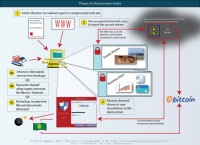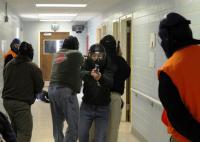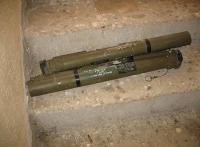-
State Department holds competition for social media apps challenging terrorism
Can the obsession millennials have with smart technology be capitalized on as a weapon against terrorist propaganda? The U.S. Department of State thinks so, and has selected three teams of student finalists — chosen from fifty-six universities around the world — to its headquarters in Washington, D.C., next week for the “Peer-to-Peer: Challenging Extremism challenge.”
-
-
Bin Laden’s bodyguard released from Guantanamo after 14 years in custody
Abdel Malik Abdel Wahab al-Rahabi, a Yemenite who was one of Osama bin Laden’s bodyguards, has been released from Guantanamo after being held for fourteen years in custody without charges filed against him. The Department of Defense cleared al-Rahabi for release in March 2014, but he release was delayed because of the war in Yemen. Instead of Yemen, al-Rahabi has been sent to Montenegro to be resettled there. Al-Rahabi is the second former Gitmo inmate to be resettled in Montenegro.
-
-
Colombian government, FARC announce end to Latin America’s longest war

In a historic move, the Colombian government and Marxist FARC guerrilla movement have announced that they have reached a deal on a bilateral ceasefire — the last major step toward ending one of the world’s longest wars. The cease fire agreement will be signed on Thursday in Havana by President Juan Manuel Santos and FARC rebel leader Rodrigo Londono, better known by his nom de guerre Timochenko. The war between the Marxist FARC and successive Colombian governments began in 1964. It has claimed 220,000 lives and forced 6.6 million out of their homes. ”Un sueño que comienza a ser realidad,” tweeted Juan Manuel Santos, Colombia’s president.
-
-
Community policing practices to prevent violent extremism
A new manual designed for police departments identifies a set of promising practices for using community policing to prevent violent extremism. “Creating a comprehensive community outreach program can build the kind of trust necessary to combat violent extremism,” said the manual’s lead author.
-
-
After 4 years CBP IA disabled vet still mired in employment procedures

Lieutenant Commander J. Gregory Richardson (retired), a decorated Naval officer with almost thirty years of military service to his country, maintains that while employed as a GS-14 Senior Security Analyst in the Integrity Programs Division (IPD) at Customs and Border Protection Internal Affairs (CBP IA), his immediate supervisors and the Senior Executive at CBP IA repeatedly ignored his multiple medical issues. The failure of these supervisors, alleges Richardson, led to a deterioration in his medical conditions until, finally, he could no longer endure the pain from which he suffered. He missed many days at work, and this absenteeism, according to documents provided, was a major reason he was fired from IPD. Since 2013 Richardson has been seeking information from CBP about any investigations or reports about him while he was an employee.
-
-
Brexit will not weaken European security: Expert

On Thursday U.K. citizens will vote in a referendum on whether Britain should remain a member of the European Union or exit the EU (“Brexit”). The most recent polls show a slight advantage for the “Remain” campaign, but pollsters say the vote is too close to call. Some security experts have argued that British exit from the EU would weaken Britain’s – and Europe’s – capabilities in the fight against terrorism, but Thorsten Benner, the director of the Global Public Policy Institute (GPPi) in Berlin, disagrees. He argues that it is unlikely we will see a fundamental weakening of European security should U.K. voters choose to leave the European Union.
-
-
White House: Uranium discovered by IAEA likely tied to Iran’s nuclear weapons program

Obama administration officials concluded that particles of uranium found at Iran’s Parchin military base and revealed in the International Atomic Energy Agency’s final report on the country’s past nuclear activities were likely tied to the regime’s nuclear weapons program. The admission further underscores concerns that the IAEA’s investigation into Iran’s nuclear activities at Parchin should not have been closed following the report’s publication.
-
-
Tips on how to avoid ransomware attacks

Individuals and businesses have become targets to a growing online fraud scheme known as ransomware. Ransomware is a form of malware used by cyber criminals to freeze your computer or mobile device, steal your data and demand that a “ransom” — typically anywhere from a couple of hundreds to thousands of dollars — be paid. The FBI, ransomware victims lost more than $18 million between April 2014 and June 2015.
-
-
Preparing for the worst case scenario

The number of incidents involving armed attackers (active shooter incidents) has been on the rise over recent years with attacks taking place around the world — from the United States to India, from Norway to France to Kenya. Control Risks says that its Active Shooter training helps increase awareness of the threat and, in the worst case scenario, how best they can protect themselves.
-
-
Trump calls for profiling of Muslims, surveillance of mosques
Providing more details about his response to the Orlando shooting, Donald Trump on Sunday proposed the profiling of Muslims by law enforcement, and the nation-wide implementing of a Muslim surveillance programs which was used for a while by the NYPD, but which was discontinued after it had failed to yield a single useful lead.
-
-
2015 global forced displacement breaks records
Wars and persecution have driven more people from their homes than at any time since the UN began keeping refugee records. A new, detailed study which tracks forced displacement worldwide found a total 65.3 million people were displaced at the end of 2015, compared to 59.5 million just twelve months earlier. The report found that, measured against the world’s population of 7.4 billion people, one in every 113 people globally is now either an asylum-seeker, internally displaced, or a refugee.
-
-
Tracking, analyzing how ISIS recruits through social media

A team of researchers has developed a model to identify behavioral patterns among serious online groups of ISIS supporters that could provide cyber police and other anti-terror watchdogs a roadmap to their activity and indicators when conditions are ripe for the onset of real-world attacks. The researchers apply the laws of physics to study how terrorist support groups grow online, and how law enforcement can track activities.
-
-
U.S. diplomats call for "targeted military air strikes" against Assad's government
More than fifty U.S. diplomats have circulated an internal memo to fellow Department of State employees, criticizing the administration’s policies in Syria and calling for air strikes against President Bashar al-Assad’s government forces. The “dissent channel cable” was signed by fifty-one mid-to high-level State Department officials involved in advising on Syria policy. The document calls for “targeted military air strikes” against Assad’s government.
-
-
ISIS has committed a genocide against the Yazidis: UN
ISIS has committed the crime of genocide as well as multiple crimes against humanity and war crimes against the Yazidis, thousands of whom are held captive in the Syrian Arab Republic where they are subjected to almost unimaginable horrors. A new UN report says ISIS has sought to destroy the Yazidis through killings, sexual slavery, enslavement, torture, and inhuman and degrading treatment and forcible transfer causing serious bodily and mental harm, and the infliction of conditions of life that bring about a slow death.
-
-
Former IDF general: Hezbollah could fire 1,200 rockets daily into Israel during next war

A former IDF general warned Israelis earlier this week that the next war with the Iran-backed Lebanese terror organization Hezbollah would lead to a barrage of rockets into Israel on an order of magnitude higher than anything Israel has yet faced. Major General (res.) Yitzhak Gershon said that the 2006 war between Israel and Hezbollah featured up to 160 rockets per day fired at Israel’s north. But given Hezbollah’s military buildup, “we need to expect up to 1,200 rockets in a day– it will be a completely different scenario from anything we’ve known.”
-
More headlines
The long view
Factories First: Winning the Drone War Before It Starts
Wars are won by factories before they are won on the battlefield,Martin C. Feldmann writes, noting that the United States lacks the manufacturing depth for the coming drone age. Rectifying this situation “will take far more than procurement tweaks,” Feldmann writes. “It demands a national-level, wartime-scale industrial mobilization.”
No Nation Is an Island: The Dangers of Modern U.S. Isolationism
The resurgence of isolationist sentiment in American politics is understandable but misguided. While the desire to refocus on domestic renewal is justified, retreating from the world will not bring the security, prosperity, or sovereignty that its proponents promise. On the contrary, it invites instability, diminishes U.S. influence, and erodes the democratic order the U.S. helped forge.
Fragmented by Design: USAID’s Dismantling and the Future of American Foreign Aid
The Trump administration launched an aggressive restructuring of U.S. foreign aid, effectively dismantling the United States Agency for International Development (USAID). The humanitarian and geopolitical fallout of the demise of USAID includes shuttered clinics, destroyed food aid, and China’s growing influence in the global south. This new era of American soft power will determine how, and whether, the U.S. continues to lead in global development.
Water Wars: A Historic Agreement Between Mexico and US Is Ramping Up Border Tension
As climate change drives rising temperatures and changes in rainfall, Mexico and the US are in the middle of a conflict over water, putting an additional strain on their relationship. Partly due to constant droughts, Mexico has struggled to maintain its water deliveries for much of the last 25 years, deliveries to which it is obligated by a 1944 water-sharing agreement between the two countries.
How Disastrous Was the Trump-Putin Meeting?
In Alaska, Trump got played by Putin. Therefore, Steven Pifer writes, the European leaders and Zelensky have to “diplomatically offer suggestions to walk Trump back from a position that he does not appear to understand would be bad for Ukraine, bad for Europe, and bad for American interests. And they have to do so without setting off an explosion that could disrupt U.S.-Ukrainian and U.S.-European relations—all to the delight of Putin and the Kremlin.”
How Male Grievance Fuels Radicalization and Extremist Violence
Social extremism is evolving in reach and form. While traditional racial supremacy ideologies remain, contemporary movements are now often fueled by something more personal and emotionally resonant: male grievance.
